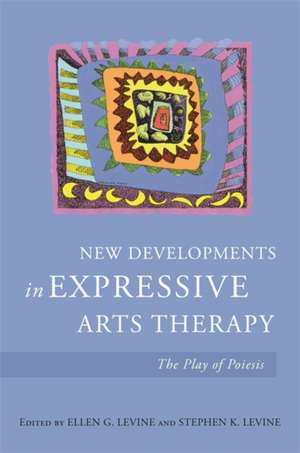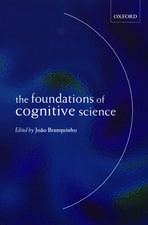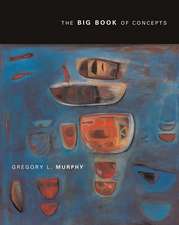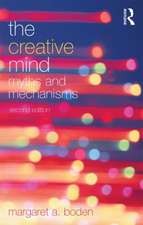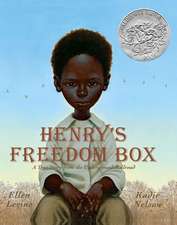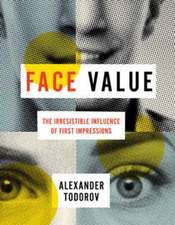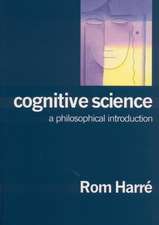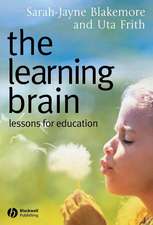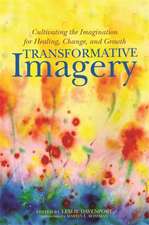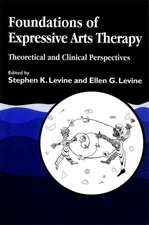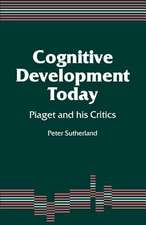Expressive Arts in Therapy, Education, Social and Ecological Change, and Research
Editat de Stephen K. Levine, Ellen Levine Contribuţii de Sally Atkinsen Limba Engleză Paperback – 20 iun 2017
Preț: 226.42 lei
Preț vechi: 289.55 lei
-22% Nou
Puncte Express: 340
Preț estimativ în valută:
43.32€ • 45.36$ • 35.85£
43.32€ • 45.36$ • 35.85£
Carte disponibilă
Livrare economică 17-31 martie
Preluare comenzi: 021 569.72.76
Specificații
ISBN-13: 9781785922473
ISBN-10: 1785922475
Pagini: 336
Dimensiuni: 150 x 228 x 20 mm
Greutate: 0.45 kg
Editura: JESSICA KINGSLEY PUBLISHERS
ISBN-10: 1785922475
Pagini: 336
Dimensiuni: 150 x 228 x 20 mm
Greutate: 0.45 kg
Editura: JESSICA KINGSLEY PUBLISHERS
Cuprins
Preface. Stephen K. Levine. Stuhl-leben. Brigitte Wanzenreid. The Poietics of Alterity. Stephen K. Levine. Part I. Theory. Pasture 6. Shaun McNiff. After. Sally Atkins. 1. Cultivating Imagination. Shaun McNiff. 2. The Essence in a Therapeutic Process, an Alternative Experience of Worlding? Paolo J. Knill. 3. Longing for Beauty and the Work: An Interview with Paolo Knill. 4. Modality: A Phenomenological Concept for Expressive Arts. Jacques Stitelmann. 5. The Poietic Basis of Being: Thoughts on Expression and the Other Person Based on the Work of Merleau-Ponty. Majken Jacoby. Part II. Therapy. Nutcase Alarm. Rowesa Gordon. Practicum on the Eating Disorders Ward: Sonnet 1. Shara Claire. 6. The Arts Work: The Process of Intermodal Decentering in Professional Conversations. Herbert Eberhart. 7. The Question of Quality Art in Expressive Arts Therapy. Shaun McNiff. 8. A Tango in the Ruins: Encounters with Beauty in a Harm Reduction Environment. Sabine Silberberg. 9. Stepping into Locked Space: An Algorithmic Dialogue Between Choreography and In-Patient Work. Rebekah Windmiller. 10. The Garden of Praise and Lament: Expressive Arts Group Psychotherapy with Trauma Survivors in Exile. Melinda Ashley Meyer DeMott. 11. Play, Art and Ritual: Working Therapeutically with Children and their Parents. Ellen G. Levine. Part III. Education. Untitled. Judy Nisenholt. CHANGE in the AIR. Elizabeth McKim. 12. Aesthetic Education: Learning Through the Arts. Stephen K. Levine. 13. Aesthetic Responsibility in Expressive Arts: Thoughts on Beauty, Responsibility and the New in the Education of Expressive Arts Professionals. Margo Fuchs Knill and Paolo Knill. 14. Education on the Edge: Acts of Balance. Elisabeth Hösli and Peter Wanzenried. 15. Art Asylum: Exploring Otherness Through Play and Art-making. Ellen Levine. 16. Artists in Community: The Black Mountain College and the White Mountain Graduate School. Sally Atkins. Part IV. Social and Ecological Change. Degradation and Preservation (mixed media on cardboard). Ellen Levine. Cedar Fire Fragment. Judith Greer Essex. 17. Community Art: Communal Art-Making to Build a Sense of Coherence. Paolo J. Knill. 18. The Pulse of Humanity. Carrie MacLeod. 19. What Do You Care About? Arts Therapies in Support of Civil Courage in a 'World Gone Slightly Mad'. Rosemary Faire. 20. Why Eco-philosophy and Expressive Arts? Per Espen Stoknes. 21. Nature as a Work of Art: Towards a Poietic Ecology. Stephen K. Levine. Part V Research. ROCK, from 4 perspectives (2004). Kelly Lycan. AMONG. Elizabeth McKim. 22. The Open Space of Art-Based Research. Shaun McNiff. 23. Crafting Maps, Attuning to Flesh, and Dancing the Radicant: Mobilizing the Expressive Arts and Arts-Based Research to do a Conceptual Translation of 'Science as Usual'. Kelly Clark/Keefe, Jessica Gilway and Emily Miller. 24. Knowing Not-Knowing: Research as an Art-Analogue Process. Sabine Silberberg. 25. Playing with Auschwitz: A Liminal Inquiry into Images of Evil. Lisa Herman. 26. Per-forming Home: Spinning New Scripts for Re-Search. Carrie MacLeod. Cold Spell. Isabel Hayeur. Two Poems. Margo Fuchs Knill. Contributors.
Descriere
With contributions from well-known, international arts therapists, this collection considers the development and expansion of the field of expressive arts. It covers new theoretical concepts and practice introduced in recent years and reflects on their relevance to the fields of therapy, education, research and social and ecological change.
